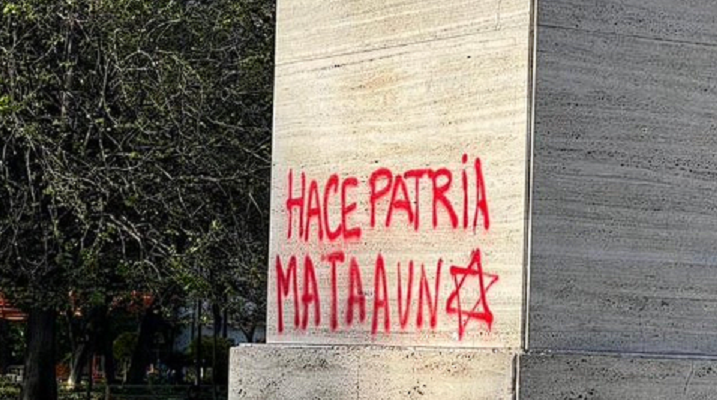The graffiti appeared just two days after the one-year anniversary of the October 7th massacre.
The antisemitic slogan “Serve the nation, kill a Jew” was graffitied on a prominent monument in Buenos Aires on Wednesday, just two days after the one-year anniversary Hamas’s Oct. 7 massacre across southern Israel.
The timing of the vandalism was intentional, according to the executive director of Argentina’s Jewish umbrella organization, the Delegation of Argentine Israelite Associations (DAIA).
“It is no coincidence that these antisemitic demonstrations appear 48 hours after the first anniversary of the Hamas attack against the State of Israel, because they express the same terrorist ideas: eliminating the Jewish people,” Victor Garelik said in a statement.
Jews in the Argentine capital of Buenos Aires marked the first anniversary of the Oct. 7 attack with an event organized by the DAIA that drew 15,000 attendees, according to the Israeli embassy in Argentina.
Two days later, however, “Serve the nation, kill a Jew” was written onto a column of a monument to Simon Bolivar, historically considered “the Liberator” of South America, in Parque Rivadavia in Buenos Aires. A Jewish star replaced the final word of the slogan, which has a long history in Argentina.
The antisemitic slogan “Serve the nation, kill a Jew” was graffitied on a prominent monument in Buenos Aires on Wednesday, just two days after the one-year anniversary Hamas’s Oct. 7 massacre across southern Israel.
The timing of the vandalism was intentional, according to the executive director of Argentina’s Jewish umbrella organization, the Delegation of Argentine Israelite Associations (DAIA).
“It is no coincidence that these antisemitic demonstrations appear 48 hours after the first anniversary of the Hamas attack against the State of Israel, because they express the same terrorist ideas: eliminating the Jewish people,” Victor Garelik said in a statement.
Jews in the Argentine capital of Buenos Aires marked the first anniversary of the Oct. 7 attack with an event organized by the DAIA that drew 15,000 attendees, according to the Israeli embassy in Argentina.
Two days later, however, “Serve the nation, kill a Jew” was written onto a column of a monument to Simon Bolivar, historically considered “the Liberator” of South America, in Parque Rivadavia in Buenos Aires. A Jewish star replaced the final word of the slogan, which has a long history in Argentina.
As the Jewish Telegraphic Agency noted in a report on the graffiti, a close variant of the antisemitic phrase was used by the Nationalist Liberation Alliance, a World War II-era Argentine movement affiliated with the Nazis. It was later used by Tacura, a fascist movement that was active in Argentina in the decades following the war.
Then about 10 years ago, residents in the town of General Paz received tax bills with the slogan printed on them. The city official responsible was sentenced to a suspended jail term and ordered to apologize and learn about the Holocaust.
The DAIA, which condemned the “serious antisemitic graffiti,” said it filed an official complaint with the City’s Public Prosecutor’s Office “in order to find those responsible for this anti-Jewish act.” The local government quickly cleaned up the graffiti after it was discovered.
This week’s incident came less than a month after the DAIA presented a report to the Buenos Aires City Legislature showing Argentina experienced a 44 percent increase in reported antisemitic incidents last year, mostly after the Palestinian terrorist group Hamas’s Oct. 7 attack on Israel and amid the ensuing war in Gaza.
According to the report, a total of 598 complaints of antisemitism were registered in 2023, and a staggering 57 percent of all such antisemitic cases occurred in just the three months after the Hamas atrocities of Oct. 7.
“There was a significant rise in Judeophobia in universities, and anti-Zionist rhetoric increased by 380 percent compared to 2022, across the country,” the DAIA said in a statement.
Meanwhile, the report found that some 65 percent of antisemitic acts occurred in the “digital space,” while the remaining number of incidents in the “physical space” marked a significant increase from the prior year.
“The [Oct. 7] massacre increased the number of [antisemitic] complaints, far from generating empathy and condemnation,” Garelik said during the presentation, according to Argentine media.
The DAIA report found that visceral hatred of Israel was a major source of the surge in antisemitism, causing 40 percent of last year’s antisemitic incidents in Argentina compared to just 11 percent the prior year.
Twice as many in-person antisemitic cases occurred after Oct. 7 in Argentina last year than during the prior nine full months of 2023. One such incident after the Hamas massacre was a building that hung a sign reading, “Zionists out of Palestine. This did not start on 7/10. Hitler fell short.”
The uptick in anti-Jewish outrages appeared to have continued unabated. According to the DAIA, this week’s graffiti was one of more than 500 antisemitic incidents the organization had recorded this year.
Amid such a surge in anti-Jewish acts of hate, Argentina has become a key player in organizing efforts to combat antisemitism in recent months. In July, for example, more than 30 countries led by the United States adopted “global guidelines for countering antisemitism” during a gathering of special envoys and other representatives from around the globe in Argentina.
The gathering came one day before Argentina’s Jewish community commemorated the 30th anniversary of the 1994 targeted bombing of the Argentine Israelite Mutual Association (AMIA) Jewish community center in Buenos Aires. Argentine President Javier Milei, a vocal supporter of the Jewish community, promised to right decades of inaction and inconsistencies in the investigations into the attack.
In April, Argentina’s top criminal court blamed Iran for the attack, saying it was carried out by Hezbollah terrorists responding to “a political and strategic design” by Iran.
Iran is the chief international sponsor of Hamas and Hezbollah, providing the Islamist terrorist group with weapons, funding, and training.
Argentina has a Jewish population of nearly 200,000, the largest in Latin America.
